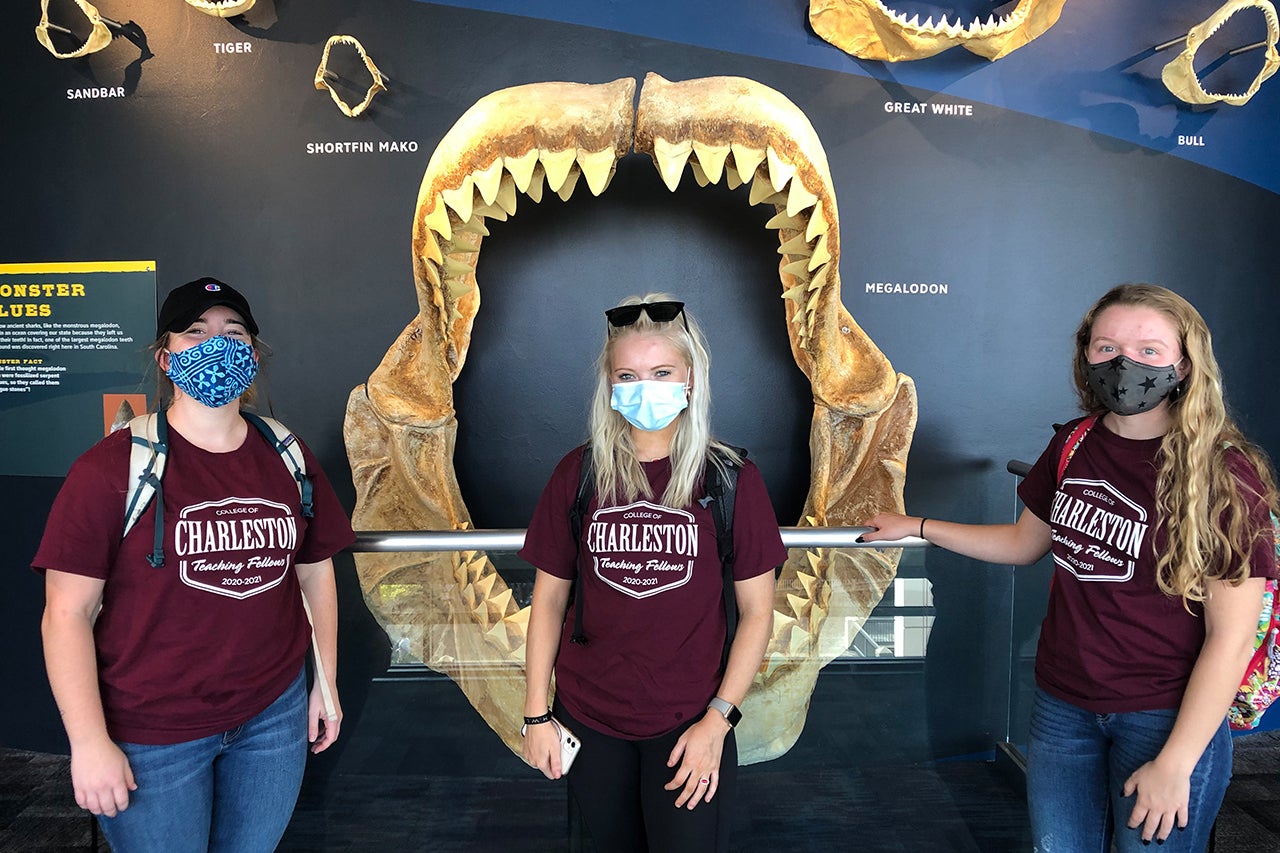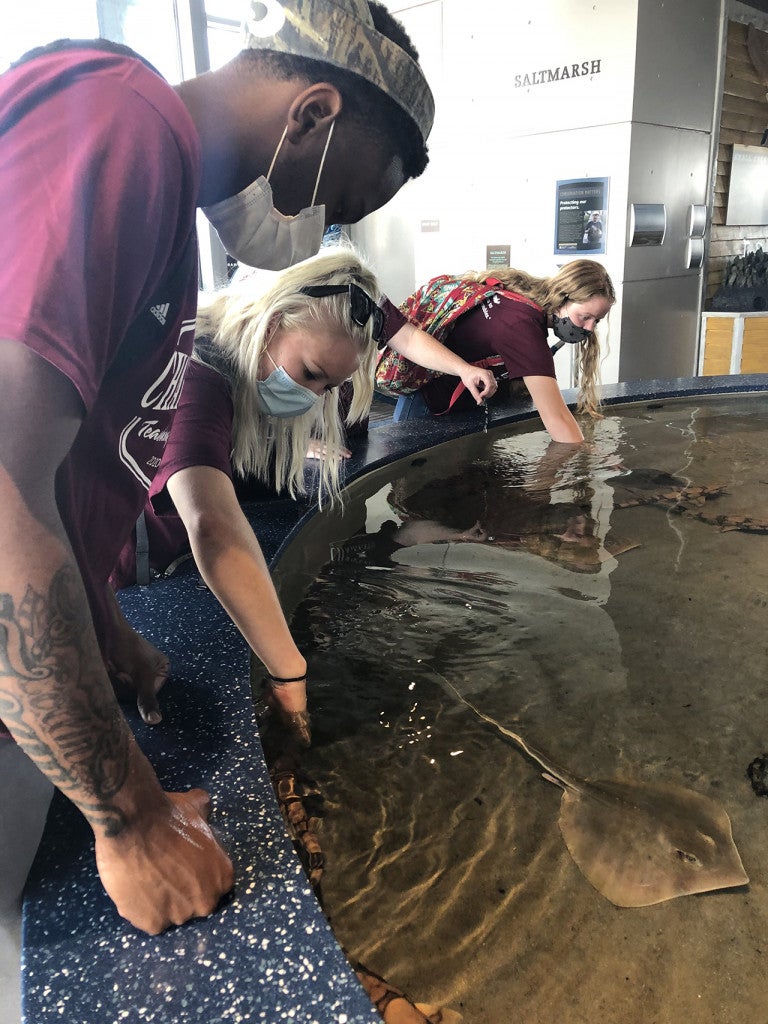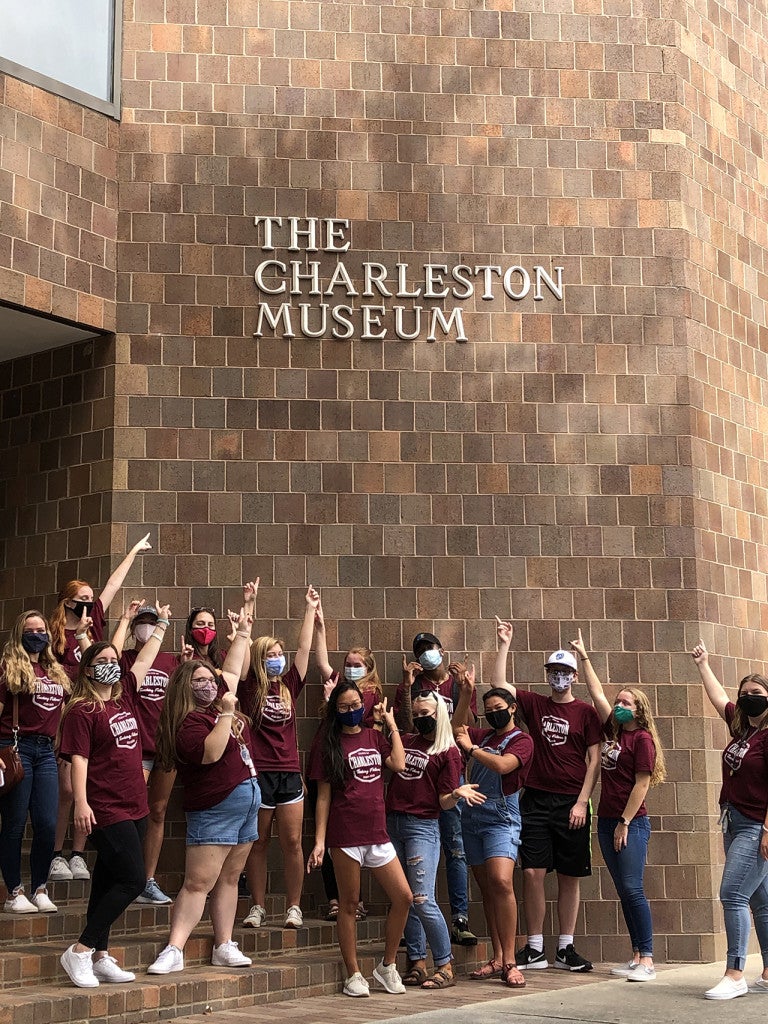Exploration, discovery, discussions and research are all key components of the College of Charleston’s First Year Experience (FYE) program, which is designed to fully integrate new students into the academic and cultural community of the College. FYE usually includes activities outside the classroom, and although the COVID-19 pandemic presented challenges for the fall 2020 semester, faculty still found ways to connect students with learning opportunities beyond their books.
“During the pandemic first-year students have faced many more obstacles than normal to finding ways to make new friends and interact with one another,” says Sarah Owens, director of the First Year Experience program and professor of Hispanic Studies. “FYE professors have made an extra effort to help students get excited about their course content while providing a semblance of normalcy. I’m proud of the myriad of extra opportunities we have offered our students this semester. Watching the stars with your astronomy professor or attending a local comedy night with your tourism class can very well be the highlight of a student’s first year here at the College of Charleston.”
Thinking Outside the Boat
For her environmental education seminar, Deborah Bidwell, senior instructor for the Department of Biology and teacher of the FYE seminar, Biomimicry: Nature as Mentor, typically likes to hold an outdoor environmental education activity on a boat. But that wasn’t as easy to pull off this fall.
“This time, we had to find a boat that would allow for social distancing and would be in walking distance,” says Bidwell.
Lisa Young, assistant professor of English and African American Studies, also wanted a boat tour to raise awareness about the environment among the students in her FYE course, An Earth Without Us, which she taught together with Vijay Vulava, professor of geology. Fortunately, the boat Bidwell found had more than enough room for Young’s students, too. And there was even room on the boat for another class. Young and Bidwell found willing partners in the teachers of Earthquakes, Hurricanes, Floods and Artillery — Lancie Affonso ’96, Honors College faculty fellow, and Steve Jaumé, associate professor of geology.
The Saturday trip began at 9 a.m. with more than 30 students, who were guided through the wonders of Charleston Harbor by an expert local naturalist. They learned about the importance of everything from the saltmarsh grasses to local wildlife.
“We weren’t able to have the full experience and go all the way to Morris Island as intended, but we were still able to hit some historical hotspots like Fort Sumter and talk about the history behind some of the locations we passed while in the water,” says Kandy Griffin, a freshman from Goose Creek, South Carolina, who plans to major in vocal performance. “We learned about some of the wildlife, like the dolphins and birds, as well as their feeding and mating habits. There were also crabs both on board and on the dock, and we learned about crabbing and how to distinguish the males from females.”
For Gabby Quintero, who is considering majoring in marine biology, the birds were the main attraction.
“The skimmers were actually quite unique,” says the Summerville, South Carolina native. “They have a longer bottom bill for scooping up dinner and fly in sync with each other, which creates this awesome wave-like image. If you haven’t seen them fly, it’s definitely something you should look into.”
Of course, the opportunity to socialize proved to be a big plus, too.
“With other FYE students on the trip, it was a good opportunity to meet more CofC students,” says Will Scheper, who hails from Beaufort, South Carolina, and plans to major in marine biology. “It was also good to meet up with some of the other students in my FYE and get to know them outside of the classroom setting.”
Education Outside the Classroom
Through her Teaching Fellows FYE seminar, Associate Professor of teacher education Tracey Hunter-Doniger aimed to show teaching fellows — students who have chosen education as their major and profession and will go on to teach in the State of South Carolina — what culturally responsive teaching looks like in the classroom.
“Culturally responsive teaching is a mindset and way of teaching, which requires that the teacher recognizes the importance of including students’ cultural references in all aspects of learning,” explains Hunter-Doniger. “It’s not a bag of tricks, but a way of teaching and caring about the students — who they are and where they come from.”
Part of that mindset includes learning how to make outings a classroom experience. They walked to the S.C. Aquarium and the Charleston Museum, where they learned how to incorporate these locations into their future curriculum and how to make it relevant to their future students.
FYE Teaching Fellows visit the South Carolina Aquarium and The Charleston Museum. (Photos provided)
Because the teaching fellows couldn’t visit the schools due to the COVID-19 pandemic, they wanted to do something impactful. Led by students Lily Kruft and Emily O’Toole, the class received a Center for Partnership to Improve Education grant from the School of Education, Health, and Human Performance. With the grant, they purchased culturally responsive books from a local bookstore, which they donated to four local elementary schools.
The teaching fellows took their donation one step further by providing videos of them reading the 32 books. They felt this would be a great resource for the educators teaching online. In addition to sharing the videos with the schools that received the books, the teaching fellows passed it on to other CofC education graduates.
Education major Collin Sitton reads ‘I Am Enough.’
“I am so proud of them,” says Hunter-Doniger of her 15 teaching fellows. “They really worked hard to reach out to the students, and the children were thrilled that college students took the time to read to them.”
And those real-life, hands-on experiences are what the FYE program is all about.
“Even before the pandemic, the out-of-the-classroom experience was one of the hallmarks of the First Year Experience program,” says Ownes. “Students thrive on interactions with their peers and professors, and when you can combine that with an excursion to a local museum or a dinner and a play, the combination is like gold.”








